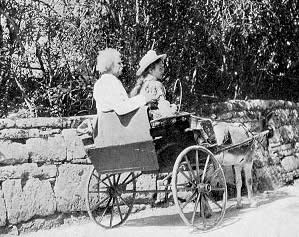The Bermuda Adventures Of Mark Twain
 Mark Twain is all over Google as the Internet search giant marked what would have been his 176th birthday yesterday [Nov.30] with one of its trademark doodles — but the great American author would probably still rather be in his beloved Bermuda.
Mark Twain is all over Google as the Internet search giant marked what would have been his 176th birthday yesterday [Nov.30] with one of its trademark doodles — but the great American author would probably still rather be in his beloved Bermuda.
Born Samuel Langhorne Clemens in 1835, his pen name Mark Twain came from the call steamboat navigators used for the two-fathom mark when taking depth soundings on the Mississippi.
Between 1867 and his death in 1910, Twain visited Bermuda numerous times, enchanted by the inhabitants of “that happy little paradise” from the time he first set foot here ["The spectacle of an entire nation grovelling in contentment is an infuriating thing"]. The author [pictured above in a donkey cart on Pitts Bay Road] also extolled the island’s “peaceful serenities and its incomparable climate” ["The early twilight of a Sunday evening in . . . Bermuda, is an alluring time. There is just enough of whispering breeze, fragrance of flowers, and sense of repose to raise one's thoughts heavenward; and just enough amateur piano music to keep him reminded of the other place"].
In Bermuda he found “no rush, no hurry, no money-getting frenzy, no fretting, no complaining, no fussing and quarreling; no telegrams, no daily newspapers, no railroads, no tramways, no subways, no trolleys, no Ls, no Tammany, no Republican party, no Democratic party, no graft, no office-seeking, no elections, no legislatures for sale; hardly a dog, seldom a cat, only one steam-whistle; not a saloon, nobody drunk; no W.C.T.U.; and there is a church and a school on every corner. The spirit of the place is serenity, repose, contentment, tranquility.”
For the last three years of his life the island became his second home, with the author staying at both the Princess Hotel and the private residence “Bay House” just off Pitts Bay Road.
The writer of such perennial classics as “Adventures of Huckleberry Finn,” “The Adventures of Tom Sawyer” [celebrated in the Google doodle], “A Connecticut Yankee in King Arthur’s Court,” “The Innocents Abroad,” “The Prince and the Pauper,” “Life on the Mississippi” and “The Tragedy of Pudd’nhead Wilson”, he died at the age of 74 at his Connecticut home on April 21, 1910 — just days after leaving Bermuda for the final time. Bouquets of Bermuda Easter lillies garlanded his coffin at a funeral service at New York’s Brick Church.
Shortly before his death, the author famously remarked: “You go to heaven if you want to — I’d rather stay right here in Bermuda.”
One hundred years later, Twain made a surprise reappearance on international bestseller lists with the “Autobiography of Mark Twain,” dictated by the author during his lifetime but barred from publication until a century after his death.
After it began to sell well, “The Los Angeles Times” pointed out in a review earlier this year that “Twain’s sly humour and scepticism about wealthy elites, US militarism, politicians and organized religion hold a seemingly timeless appeal.”
While at the Princess Hotel in 1908, Clemens first met a young American visitor called Margaret Blackmer. He described her laugh as “the rippling laugh that a happy brook makes when it breaks out of the shade into the sunshine. … We were close comrades — inseparables in fact — for eight days”. The two took daily excursions in a donkey cart to Spanish Point.
Margaret was the daughter of business tycoon Henry Myron Blackmer, a New England lawyer who had gone to Colorado and made a fortune as a financier of railroads, a banker and oilman.
The Only Known Film Of Mark Twain Shot In Connecticut In 1909
Elizabeth Wallace, a dean at the University of Chicago, was also wintering in Bermuda in 1908 and made the acquaintance of both Mark Twain and his young companion and accompanied them on their travels around Pembroke.
Miss Wallace subsequently wrote of the friendship she forged with the author in Bermuda in the book “Mark Twain and the Happy Island”.
Published in 1913, this account of Mark Twain’s twilight days in Bermuda was described by the author’s literary executor Albert Bigelow Paine as “having a place of its own in Mark Twain literature, in that it presents an idyllic picture of our philosopher-humorist in the serener days of his later life — a picture of which the author herself was a part.”
In his introductory remarks to the book, Mr. Paine said: “Mark Twain always loved Bermuda, from the first day of his first visit, to that last day of his final visit, when he sailed away with the shadows already gathering just ahead. Miss Wallace’s story is a tender one, showing him still full of life and health, and of that gracious sympathy with childhood which was always one of his chief characteristics and added comfort to his later years.
“The world will be the better and Mark Twain’s memory the sweeter for these gentle chapters.”
The full text of “Mark Twain And The Happy Island” appears below.
The 227-page e-book is below, click ‘Fullscreen’ for greater clarity:
Read More About
Comments (5)
Trackback URL | Comments RSS Feed
Articles that link to this one:
- Mark Twain News | December 5, 2011
- pernennial peanut | December 13, 2011
- Mark Twain: “Our Friends The Bermudians” | Bernews.com | March 29, 2013
- Masterworks To Host “Ever The Twain Shall Meet” | Bernews.com | January 7, 2014



The way MT describes the island one wants to wish we were back there.